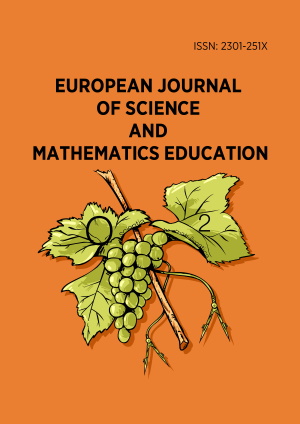Research Article
Preparing, leading, and reflecting on whole-class discussions: How prospective mathematics teachers develop their knowledge during lesson study
More Detail
1 Instituto de Educação, Universidade de Lisboa, Lisbon, PORTUGAL* Corresponding Author
European Journal of Science and Mathematics Education, 11(1), January 2023, 33-48, https://doi.org/10.30935/scimath/12432
Published Online: 08 September 2022, Published: 01 January 2023
OPEN ACCESS 2967 Views 1390 Downloads
ABSTRACT
This research aims to understand how prospective teachers develop their knowledge about whole-class discussions during a lesson study. Following a qualitative approach, we focus on the work of three prospective mathematics teachers preparing, leading, and reflecting on whole-class discussions. Data was collected through participant observation with field notes, audio recordings, and document collection. The results show that a detailed analysis of a lesson plan, previously prepared autonomously by a prospective teacher based on a guide, promotes a focused discussion and a collaborative environment. Additionally, being involved in each other’s formative process, through lesson study micro-cycles, created opportunities for prospective teachers to analyze and discuss different classroom situations, which promoted the development of their knowledge. Finally, classroom experiences seemed to be fundamental for the development of prospective teachers’ knowledge. They were able to put into practice the work carried out during the lesson study, which allowed them to link theory and practice, and reflect on their own practice. This research also underlines the importance of the teacher educator’s role in creating fruitful opportunities for the development of prospective teachers’ knowledge.
CITATION (APA)
Martins, M., Ponte, J. P. D., & Mata-Pereira, J. (2023). Preparing, leading, and reflecting on whole-class discussions: How prospective mathematics teachers develop their knowledge during lesson study. European Journal of Science and Mathematics Education, 11(1), 33-48. https://doi.org/10.30935/scimath/12432
REFERENCES
- AERA. (2011). Code of ethics. Educational Researcher, 40(3), 145-156. https://doi.org/10.3102/0013189X11410403
- Ball, D. L., Thames, M. H., & Phelps, G. (2008). Content knowledge for teaching: What makes it special? Journal of Teacher Education, 59(5), 389-407. https://doi.org/10.1177/0022487108324554
- Bogdan, R. C., & Biklen, S. K. (2007). Qualitative research for education: An introduction to theory and methods. Pearson.
- Bozkurt, E., & Yetkin-Ozdemir, I. E. (2018). Middle school mathematics teachers’ reflection activities in the context of lesson study. International Journal of Instruction, 11(1), 379-394. https://doi.org/10.12973/iji.2018.11126a
- Chen, S., & Zhang, B. (2019). Improving prospective teachers’ lesson planning knowledge and skills through lesson study. In R. Huang, A. Takahasi, & J. P. Ponte (Eds.), Theory and practice of lesson study in mathematics: An international perspective (pp. 549-575). Springer. https://doi.org/10.1007/978-3-030-04031-4_27
- Coenders, F., & Verhoef, N. (2019). Lesson study: Professional development (PD) for beginning and experienced teachers. Professional Development in Education, 45(2), 217-230. https://doi.org/10.1080/19415257.2018.1430050
- Conceição, T., Baptista, M., & Ponte, J. P. (2019). Lesson study as a trigger for preservice physics and chemistry teachers’ learning about inquiry tasks and classroom communication. International Journal for Lesson and Learning Studies, 8(1), 79-96. https://doi.org/10.1108/IJLLS-11-2018-0081
- Fujii, T. (2018). Lesson study and teaching mathematics through problem solving: The two wheels of a cart. In M. Quaresma, C. Winslow, S. Clivaz, J. P. Ponte, A. Ni Shuilleabháin, & A. Takahashi (Eds.), Mathematics lesson study around the world (pp. 1-21). Springer. https://doi.org/10.1007/978-3-319-75696-7_1
- Martins, M., Mata-Pereira, J., & Ponte, J. P. (2021). Os desafios da abordagem exploratória no ensino da matemática: Aprendizagens de duas futuras professoras através do estudo de aula [The challenges of the exploratory approach in mathematics teaching: Preservice teachers' learning through lesson study]. Bolema: Boletim de Educação Matemática [Bolemma: Mathematics Education Bulletin], 35(69), 343-364. https://doi.org/10.1590/1980-4415v35n69a16
- Meiliasari, M. (2019). Mathematics pre-service teachers’ anticipation of students’ responses: A case study of lesson study for pre-service teachers. In Y. Rahmawati, & P. Taylor (Eds.), Empowering science and mathematics for global competitiveness (pp. 472-478). CRC Press. https://doi.org/10.1201/9780429461903-65
- NCTM. (2014). Principles to actions: Ensuring mathematical success for all. National Council of Teachers of Mathematics.
- Ni Shuilleabhain, A., & Bjuland, R. (2019). Incorporating lesson study in ITE: Organisational structures to support student teacher learning. Journal of Education for Teaching, 45(4), 434-445. https://doi.org/10.1080/02607476.2019.1639262
- Ponte, J. P. (2012). Estudiando el conocimiento y el desarrollo profesional del profesorado de matemáticas [Studying the knowledge and professional development of mathematics teachers]. In N. Planas (Ed.), Teoría, crítica y prática de la educación matemática [Theory, criticism and practice of mathematics education] (pp. 83-98). Graó.
- Ponte, J. P. (2017). Lesson studies in initial mathematics teacher education. International Journal for Lesson and Learning Studies, 6(2), 169-181. https://doi.org/10.1108/IJLLS-08-2016-0021
- Ponte, J. P., & Quaresma, M. (2016). Teachers’ professional practice conducting mathematical discussions. Educational Studies in Mathematics, 93, 51-66. https://doi.org/10.1007/s10649-016-9681-z
- Ponte, J. P., Mata-Pereira, J., & Quaresma, M. (2013). Ações do professor na condução de discussões matemáticas [Teacher actions in conducting mathematical discussions]. Quadrante [Quadrant], 22(2), 55-81.
- Ponte, J. P., Quaresma, M., & Mata-Pereira, J. (2017). The challenge of mathematical discussions in teachers’ professional practice. Didacticae [Didactic], 1(1), 45-59. https://doi.org/10.1344/did.2017.1.45-59
- Potari, D., & Ponte, J. P. (2017). Current research on prospective secondary mathematics teachers’ knowledge. In M. Strutchens, R. Huang, L. Losano, D. Potari, J. P. Ponte, M. C. de C. T. Cyrino, & R. M. Zbiek (Eds.), The mathematics education of prospective secondary teachers around the world (pp. 3-15). Springer. https://doi.org/10.1007/978-3-319-38965-3_2
- Shaughnessy, M., Garcia, N. M., O’Neill, M. K., Selling, S. K., Willis, A. T., Wilkes, C. E., Salazar, S. B., & Ball, D. L. (2021). Formatively assessing prospective teachers’ skills in leading mathematics discussions. Educational Studies in Mathematics, 108(3), 451-472. https://doi.org/10.1007/s10649-021-10070-z
- Shulman, L. S. (1986). Those who understand: Knowledge growth in teaching. Educational Researcher, 15(2), 4-14. https://doi.org/10.3102/0013189X015002004
- Shulman, L. S. (1987). Knowledge and teaching: Foundations of the new reform. Harvard Educational Review, 57(1), 1-22. https://doi.org/10.17763/haer.57.1.j463w79r56455411
- Stein, M. K., Engle, R. A., Smith, M. S., & Hughes, E. K. (2008). Orchestrating productive mathematical discussions: Five practices for helping teachers move beyond show and tell. Mathematical Thinking and Learning, 10(4), 313-340. https://doi.org/10.1080/10986060802229675
- Ustuk, O., & Comoglu, I. (2021). Reflexive professional development in reflective practice: What lesson study can offer. International Journal for Lesson & Learning Studies, 10(3), 260-273. https://doi.org/10.1108/IJLLS-12-2020-0092
- Willems, I., & van den Bossche, P. (2019). Lesson study effectiveness for teachers’ professional learning: A best evidence synthesis. International Journal for Lesson and Learning Studies, 8(4), 257-271. https://doi.org/10.1108/IJLLS-04-2019-0031


 The articles published in this journal are licensed under the CC-BY Creative Commons Attribution International License.
The articles published in this journal are licensed under the CC-BY Creative Commons Attribution International License.